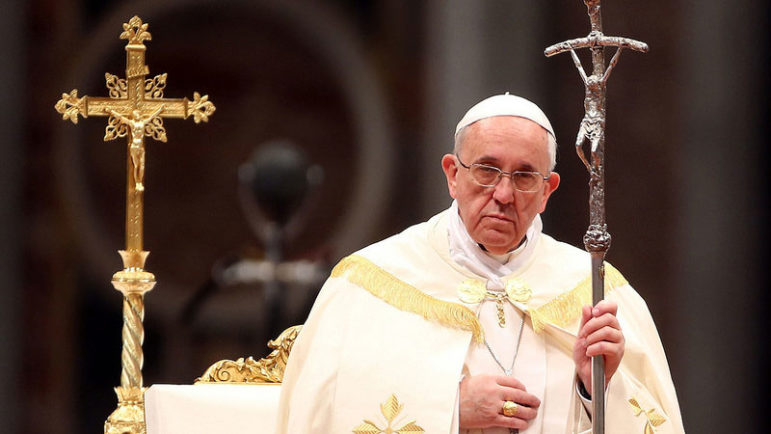
October 26, 2016; Reuters
Philip Pullella, the senior correspondent for Reuters in Rome, has worked in Italy for Reuters for the past 30 of his 35 years as a journalist. He is among those who travel with the popes—in his case, Pope John Paul II, Pope Benedict, and now Pope Francis. There is arguably no one better qualified to ask questions of those in the pope’s inner circles (even though “it is virtually impossible to determine who, if anyone, is really close to him”) and then attempt to describe Pope Francis’ management style for his readers.
“He is sometimes like the leader who says ‘I don’t care what the generals say, I will tell Lieutenant so-and-so to take that hill’,” said a source, adding that the pope enjoyed rattling an inefficient bureaucracy with what the source described as “joyful destruction.”
The Roman Catholic Church has 1.27 billion members (real people, not Facebook pages), and as one of the oldest institutions in the world it played a significant role in the history of Western civilization. Surely there are many in the Vatican the Pope manages who are not humored by this “joyful destruction.” But it would seem most of the world is overjoyed, whether Catholic or not, and especially those historically marginalized by the Church, such as the divorced. This is the title of Pullella’s article: “Pope Francis the manager—surprising, secretive, shrewd.”
He is keeping his cards close to his chest as he tries to push through a progressive agenda to make the Church more welcoming in the face of conservative opposition.
Interviews with a dozen current and past Vatican officials and aides paint a portrait of Pope Francis, a Jesuit who turns 80 in December, as eschewing filters between him and the outside world. He carries his own black briefcase, keeps his own agenda, and makes many of his own calls.
Pullella relates a number of interesting stories of how Pope Francis works. On October 9th, he announced during a television interview the names of 17 priests he elevated to the position of cardinal. The new cardinals as well as everyone in the Vatican hierarchy were taken by surprise. One of those new cardinals who spent many years in an Albanian prison during the country’s dictatorship would not likely have survived the old Vatican vetting process.
Francis likes to break rules and then change them once the shock has died down. Two weeks after his election, he included women in a liturgical service open only to men. Later, he ordered that the rules be formally changed worldwide.
Sign up for our free newsletters
Subscribe to NPQ's newsletters to have our top stories delivered directly to your inbox.
By signing up, you agree to our privacy policy and terms of use, and to receive messages from NPQ and our partners.
The cardinals elected him in 2013 with a clear mandate to reconstruct the Roman Curia, which assists the pope in governing the Catholic Church. The Roman Curia includes the Secretariats, the Curial Congregations, the Pontifical Councils, Pontifical Commissions, the tribunals, and other offices. Pope Francis’s open and candid style was illustrated when NPQ outlined in a nonprofit newswire the 15 “leadership failures” he discussed in an address to the Curia in 2014. Pope Francis took the conservative bishops by surprise early on, for example, when he suddenly streamlined the procedures by which Catholics can obtain marriage annulments.
One person close to the pope said he likes to manage this way because it gives him freedom to bypass rigid channels of communication and makes it impossible for anyone to become indispensable, as top aides of previous popes did.
Pope Francis was named Jorge Mario Bergoglio before the College of Cardinals elected him the 266th and current Pope of the Roman Catholic Church following the agonizing unraveling of Benedict’s papacy. As pope, he is also the Bishop of Rome, and Sovereign of the Vatican City. “Even though his health is good, they say he feels he has little time left and many things still to do; that perhaps explains the hastiness of some of his decisions.”
Known for his humility, concern for the poor, and his informal, if not radical, approach to ministry, such as choosing the Vatican’s guesthouse rather than the Apostolic Palace as his residence, it is fitting that he would choose to name himself in honor Saint Francis of Assisi. Pope Francis is the first Jesuit pope, the first from the Americas, and the first non-European pope since the Syrian Gregory III, who died in 741.
So what’s it like to work for Pope Francis? Are there applications from his management style for the rest of the nonprofit sector? He leads and more importantly lives by example. For Pope Francis it’s people over process, names and faces over numbers. He embraces risk. He is flattening his organization and attempting to transform an ancient bureaucracy with a long history of corruption into one that takes purpose-based actions. He walks around and asks questions unbidden. Rather than hide or ignore problems, he speaks quickly, loudly, and plainly, whether the issue is homosexuality, the famously corrupt Vatican Bank, or the role of women in the church. He genuinely likes peoples and he values connection and collaboration—for the Mass of the Last Supper in 2013, he went to a juvenile prison (instead of presiding at a major church) where he washed the feet of inmates, including women and Muslims. He leads through humility—when interviewed by a writer for America magazine, this is how the first question went:
I ask him point-blank: “Who is Jorge Mario Bergoglio?” The pope stares at me in silence. I ask him if this is a question that I am allowed to ask…. He nods that it is, and he tells me: “I do not know what might be the most fitting description…. I am a sinner. This is the most accurate definition. It is not a figure of speech, a literary genre. I am a sinner.”
He trusts the people he empowers. Also in the America interview, Pope Francis said this: “When I entrust something to someone, I totally trust that person. He or she must make a really big mistake before I rebuke that person.” It would seem that Pullella had it right, except for one missing attribute of his management style: Pope Francis the manager is surprising, secretive, shrewd—and loving and loved.—James Schaffer













